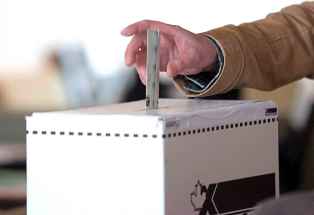Policy initiative should follow modest gesture
Read this article for free:
or
Already have an account? Log in here »
To continue reading, please subscribe:
Monthly Digital Subscription
$0 for the first 4 weeks*
- Enjoy unlimited reading on winnipegfreepress.com
- Read the E-Edition, our digital replica newspaper
- Access News Break, our award-winning app
- Play interactive puzzles
*No charge for 4 weeks then price increases to the regular rate of $19.00 plus GST every four weeks. Offer available to new and qualified returning subscribers only. Cancel any time.
Monthly Digital Subscription
$4.75/week*
- Enjoy unlimited reading on winnipegfreepress.com
- Read the E-Edition, our digital replica newspaper
- Access News Break, our award-winning app
- Play interactive puzzles
*Billed as $19 plus GST every four weeks. Cancel any time.
To continue reading, please subscribe:
Add Free Press access to your Brandon Sun subscription for only an additional
$1 for the first 4 weeks*
*Your next subscription payment will increase by $1.00 and you will be charged $16.99 plus GST for four weeks. After four weeks, your payment will increase to $23.99 plus GST every four weeks.
Read unlimited articles for free today:
or
Already have an account? Log in here »
Hey there, time traveller!
This article was published 11/10/2019 (2257 days ago), so information in it may no longer be current.
As government expenditures go, this one is so minuscule it doesn’t even register as a margin-of-error consideration. As a well-intended gesture that is perhaps an indication of future intentions, it is considerably more significant.
On Thursday, Rochelle Squires, the minister responsible for the status of women, announced that the Pallister government would mark International Day of the Girl (which occurred Friday) by distributing 500 “period packs” — bright pink zipper-top bags containing tampons, pads, mini chocolate bars, encouraging notes and other items — to at-need girls through nine women’s resource centres around the province.
The revelation that the province was spending $4,500 to distribute the packs to young women who might otherwise not be able to afford the products was accompanied by a statement by Ms. Squires that the government is also considering a move to provide menstrual hygiene products at no charge to students in grades 7 to 12.

“The intent is really to destigmatize getting your period in the first place,” the minister said of Friday’s “period packs” distribution. “We know that a lot of girls also can’t afford to have supplies on hand and that can lead to them missing school.”
She also indicated the under-consideration provision of no-charge menstrual hygiene products in public schools would cost approximately $1 million. During the recent provincial election campaign, the New Democrats pledged such a measure for students in grades 6 to 12 and placed a price tag of $300,000 on the initiative.
Cost-related haggling aside, what should be noted about Ms. Squires’ sort-of announcement is that it’s an unexpected but extremely welcome move by the Pallister government into an area in which it had previously shown no apparent inclination to act. Providing menstrual hygiene products to students whose financial status makes them unaffordable is as much a common-sense initiative as removing the PST and GST from such supplies (the latter having only been lifted in 2015), thereby eliminating the absurd and antiquated notion that menstrual products were somehow non-essential or “luxury” items.
But as encouraging as the minister’s remarks were, they remain at this point words and nothing more. There should not be any need for the government to “mull” this matter further. Instead, Ms. Squires and her colleagues should move with all due haste to follow the lead of British Columbia — which announced earlier this year that all public schools would be required to provide menstrual products at no charge in their washrooms by the end of 2019 — and move this concept from ponderment to policy.
NDP status of women critic Malaya Marcelino summed things up nicely when she said it should not be necessary for girls to miss school because they don’t have access to menstrual hygiene products.
“Making it mandatory for school divisions across the province to implement this– I think this is a no-brainer” – Malaya Marcelino
“Making it mandatory for school divisions across the province to implement this — I think this is a no-brainer,” she said.
While the government is considering this decidedly common-sense commitment, it might also take into account the reality that economic difficulty in accessing hygiene products is not limited to school-aged individuals. At present, there are nearly a dozen local agencies that collect, assemble and distribute donated “period packs” to women who otherwise cannot afford them — perhaps a practical display of government support might make their admirable efforts a bit easier and more efficient.
As Ms. Marcelino said regarding the school provision of menstrual hygiene products, “This is an easy fix.”











